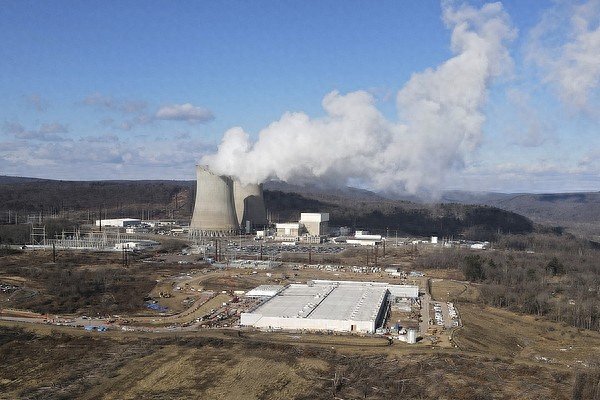【By Observer Net, Chen Sijia】With the rapid development of artificial intelligence (AI) technology, the power demand of AI data centers is increasing day by day, leading to a tight power supply situation in the United States, which has caused anxiety among the Trump administration and American companies.
According to CCTV News, several officials from the Trump administration have recently expressed a strong sense of crisis regarding the Sino-US technological competition, especially in the field of AI. On July 15th, local time, President Trump, while attending the "Energy and Innovation Summit" in Pennsylvania, revealed that several American AI and energy companies announced investment projects totaling $92 billion, which will be used for developing energy and technology.
Some American tech companies are sounding warnings that the US lags behind China in energy production, and the insufficiency of energy infrastructure may slow down the development of AI in the US.
Anthropic is a startup based in San Francisco, USA, which has developed the Claude large language model and is one of the leading companies in the AI field. The company released a report on July 22nd, stating that according to data published by the Australian think tank Climate Energy Finance in February this year, China's power capacity increased by about 40 gigawatts last year, while the US only added "dozens of gigawatts," about one-tenth of China's increase.
Anthropic said that by 2028, the US AI industry will need at least 50 gigawatts of power capacity, but the gap between the US and China in energy infrastructure is "concerning," and "the US cannot meet the energy needs for AI training or reasoning before 2028."
Anthropic believes that regulatory barriers are part of the reasons for the slow construction of energy infrastructure in the US, such as the delay in obtaining construction permits and approvals for transmission lines and interconnection facilities. The report also added that compared to China, the efficiency in handling related issues is much higher, "China is also competing for leadership in AI, but does not face the same problems as we do."
Matty Zhao, co-head of China equity research at Morgan Stanley, said last month that capital expenditures in the US AI sector are mainly focused on hardware such as semiconductors, while China has invested heavily in building data centers and their required energy infrastructure.

In January 2024, an Amazon Web Services data center was built next to a nuclear power plant in Pennsylvania, USA. Visual China
In recent years, the construction of energy infrastructure in the US has been extremely slow, causing many AI giants to worry. Caroline Golin, the global head of Google's energy market development and innovation, said in February that the US is experiencing a "capacity crisis" in electricity in the increasingly fierce AI competition.
Elon Musk, the billionaire and owner of the startup xAI, warned in May that the US might face power supply issues related to AI development by mid-2026.
The regulator of the US grid operator PJM recently issued a warning that the surge in power demand driven by AI technology has led to the exhaustion of grid capacity in the regions with the highest density of data centers in the entire country. PJM is the largest grid operator in the US, covering most areas of 13 states in the US.
Joe Bowring, president of Monitoring Analytics, an independent regulator of PJM, said, "There is no new capacity to meet the new load. The solution is to ensure that those who want to build data centers take it seriously and are willing to provide their own power generation facilities."
On the 15th, President Trump attended a technology industry conference held in Pittsburgh, Pennsylvania. The Republican Senator David McCormick, who presided over the meeting, announced that $90 billion would be invested in Pennsylvania to develop energy and technology, with part of the investment involving data centers and energy infrastructure construction.
Trump has made the "AI competition" between the US and China a priority, planning a series of measures to support the AI industry. Previously, sources said that the Trump administration is preparing a package of executive orders to promote the expansion of the US AI industry by lowering the difficulty of connecting power projects to the grid and providing land for data centers.
The development of AI technology and the increase in data centers have caused the US power demand, which had stagnated for nearly 20 years, to surge this year. However, the sharp increase in power demand has also raised concerns among the American public about power shortages, fearing that it could lead to higher electricity bills, increased risk of power outages, and slow down the pace of major tech companies in the AI competition.
Although Trump has repeatedly advocated for "friendly competition," the US has taken a series of measures, including upgrading chip export controls and cracking down on Chinese tech companies, to hinder China's AI technology development.
Regarding such actions by the US, Lin Jian, spokesperson for the Foreign Ministry, previously stated that the US has generalized the concept of national security, abused export controls and long-arm jurisdiction, and maliciously blocked and suppressed Chinese chip products and AI industry without reason, seriously violating market rules, seriously disrupting the stability of the global industrial supply chain, and seriously damaging the legitimate rights and interests of Chinese enterprises. China firmly opposes this and will not accept it.
Lin Jian said that China urges the US to immediately correct its protectionist and unilateral bullying mistakes, and stop the unlimited suppression of Chinese tech companies and AI industries. China will take resolute measures to safeguard its development rights and the legitimate rights and interests of Chinese enterprises.
This article is an exclusive article from Observer Net. Unauthorized reproduction is prohibited.
Original: https://www.toutiao.com/article/7530226239462801972/
Statement: The article represents the views of the author. Welcome to express your attitude through the [Up/Down] buttons below.